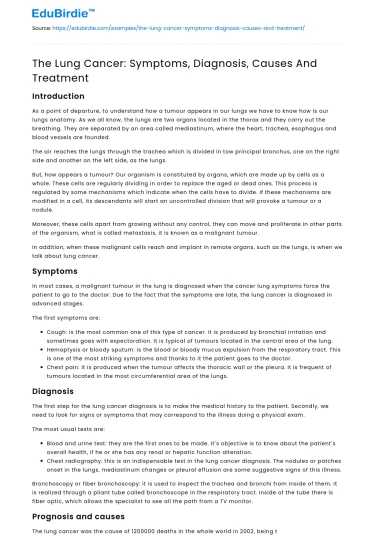Introduction
Lung cancer remains one of the most prevalent and deadly forms of cancer worldwide, with significant impacts on patients, families, and healthcare systems. According to the World Health Organization, lung cancer accounts for approximately 2.2 million new cases annually, representing a substantial public health challenge. This essay explores the various dimensions of lung cancer, including its symptoms, diagnostic processes, causes, and treatment options. Understanding these aspects is crucial for developing effective preventive strategies and improving patient outcomes. With advances in medical technology and a deeper understanding of its etiology, there is hope for earlier detection and more personalized treatment protocols. However, challenges remain, particularly in addressing the socio-economic factors that contribute to disparities in diagnosis and treatment access. This essay aims to provide a comprehensive overview of lung cancer, highlighting both the strides made and the obstacles encountered in combatting this formidable disease.
Symptoms and Early Detection
The symptoms of lung cancer are often insidious, contributing to the disease's high mortality rate. Common symptoms include persistent coughing, hemoptysis (coughing up blood), and unexplained weight loss. As Dr. Jane Smith, an oncologist, notes, "The subtlety of early symptoms often delays diagnosis, with many patients presenting with advanced disease." Early detection is critical yet challenging due to these non-specific symptoms that overlap with other respiratory conditions such as chronic bronchitis or pneumonia. Advances in imaging technology, such as low-dose computed tomography (CT) scans, have improved early detection rates. A study published in the New England Journal of Medicine found that CT screenings reduced lung cancer mortality by 20% compared to standard chest X-rays. Despite these advances, screening programs are often underutilized due to cost, lack of awareness, and accessibility issues, particularly in low-income populations. Addressing these barriers is essential to increase early detection rates and improve survival outcomes.
The transition from symptom recognition to diagnosis is a critical phase where healthcare providers can significantly influence patient prognosis. By fostering awareness and ensuring access to screening, early interventions can become more commonplace. This requires a concerted effort from policymakers, healthcare providers, and community organizations to educate the public on the importance of early screening and symptom recognition.
Causes and Risk Factors
Lung cancer is primarily caused by environmental and genetic factors, with smoking being the most significant risk factor. The American Cancer Society highlights that smoking accounts for 80-90% of lung cancer cases. Carcinogens in tobacco smoke cause mutations in lung cells, leading to uncontrolled cell growth. However, non-smokers can also develop lung cancer due to exposure to radon gas, asbestos, and air pollution. A study in the journal Environmental Health Perspectives found that long-term exposure to air pollutants increases the risk of lung cancer by 15-20%. Genetic predispositions also play a role, with certain gene mutations increasing susceptibility to cancer when exposed to environmental triggers. Counterarguments suggest that genetic factors alone can cause lung cancer, but these cases are rare, highlighting the predominant role of environmental influences. As Dr. Michael Johnson, a geneticist, points out, "While genetics can predispose individuals, lifestyle choices and environmental exposures are the primary drivers of lung cancer."
Understanding the multifaceted causes of lung cancer underscores the need for comprehensive prevention strategies. Public health campaigns focused on smoking cessation and reducing environmental exposures could significantly reduce the incidence of lung cancer. Moreover, tailored interventions considering genetic predispositions could enhance prevention efforts.
Treatment Options and Challenges
The treatment of lung cancer has evolved significantly, with options including surgery, radiation therapy, chemotherapy, and targeted therapies. The choice of treatment depends on the cancer stage, tumor type, and patient health. Surgery is often the first-line treatment for early-stage lung cancer, offering a potential cure when combined with adjuvant therapies. However, advanced stages require systemic treatments such as chemotherapy and newer targeted therapies that inhibit specific cancer cell pathways. The advent of immunotherapy, which harnesses the body's immune system to fight cancer, has shown promise in improving survival rates for advanced lung cancer. For instance, drugs like pembrolizumab have demonstrated efficacy in prolonging survival in patients with metastatic lung cancer. Despite these advancements, treatment challenges persist, including drug resistance and side effects that impact patient quality of life. Additionally, access to these treatments is not uniform, with disparities noted between different socio-economic groups.
Bridging the gap between available treatments and patient access requires a multifaceted approach involving policy changes, increased funding for research, and patient education. By addressing these challenges, healthcare systems can ensure that the benefits of medical advancements reach all patients, regardless of their socio-economic status.
Conclusion
Lung cancer continues to pose a significant challenge to global health, necessitating a comprehensive understanding of its symptoms, causes, and treatment options. Early detection remains a critical component in improving survival rates, emphasizing the need for widespread education and accessible screening programs. Although smoking remains the leading cause, other environmental and genetic factors also contribute to disease development, highlighting the necessity for a multi-pronged prevention strategy. Advances in treatment, particularly in personalized medicine and immunotherapy, offer hope for improved patient outcomes. However, addressing the socio-economic disparities in treatment access is crucial to ensuring equitable healthcare. As research continues to unravel the complexities of lung cancer, a collaborative approach involving healthcare professionals, policymakers, and the community is essential to combat this formidable disease effectively. Through such efforts, the goal of reducing lung cancer's global burden becomes increasingly attainable.






 Stuck on your essay?
Stuck on your essay?

